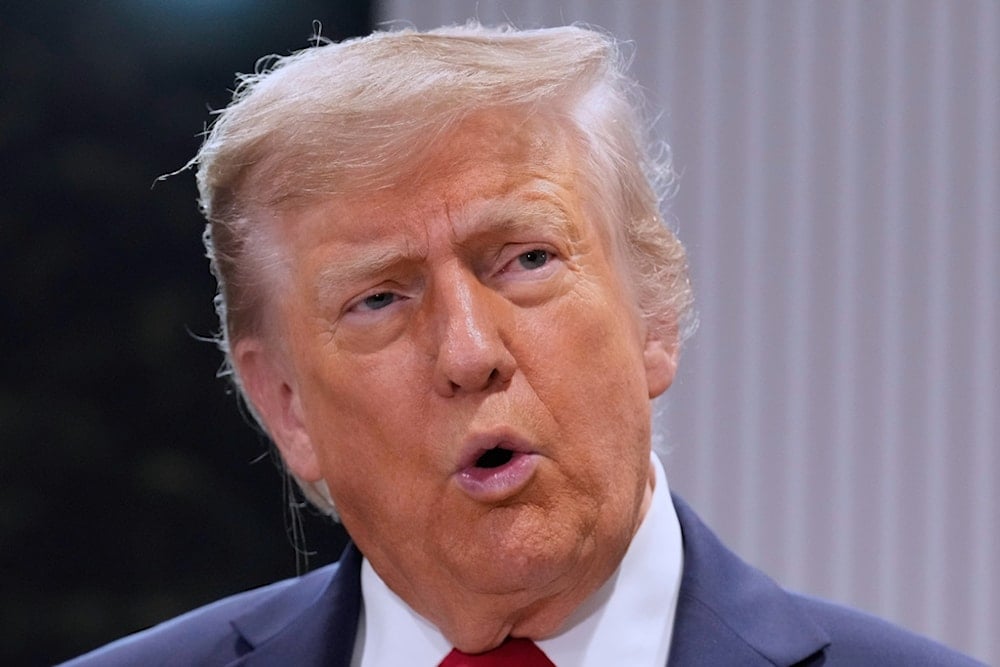Trump rejects Gabbard’s nuclear Intel, says 'I don’t care'
Trump claims Iran was "very close" to building a nuclear weapon, dismissing Tulsi Gabbard and US intelligence reports that Tehran halted its program in 2003.
-

US President Donald Trump speaks during a meeting with Canada's Prime Minister Mark Carney on the sidelines of the G7 Summit, June 16, 2025, in Kananaskis, Canada (AP)
US President Donald Trump has claimed that Iran was “very close” to acquiring a nuclear weapon, directly contradicting official assessments from the US intelligence community and US Director of National Intelligence Tulsi Gabbard.
During an exchange with a CNN reporter on Tuesday, Trump was asked how close he believed Iran had been to obtaining a nuclear weapon. The question came in light of testimony from Gabbard earlier this year, in which she cited the intelligence community’s continued assessment that Iran was not pursuing nuclear weapons.
“The IC continues to assess that Iran is not building a nuclear weapon,” Gabbard said during her March testimony. “Supreme Leader Khamenei has not authorized the nuclear weapons program that he suspended in 2003.”
Trump, however, dismissed those findings outright. “I don’t care what she said,” he replied. “I think they were very close to having one.”
Reporter: "Tulsi Gabbard [Director of National Intelligence] testified in March that the intelligence community said that Iran wasn’t building a nuclear weapon."
— Seyed Mohammad Marandi (@s_m_marandi) June 17, 2025
Trump: "I don’t care what she said. I think they were very close to having one."
Trump has been exposed. pic.twitter.com/QRGbD90whA
Iran not ready to offer new concessions
According to a report by The Wall Street Journal, Arab mediators have conveyed that Iran shows no indication of being prepared to offer new concessions should nuclear negotiations with the United States resume.
Citing unnamed regional officials involved in backchannel diplomacy, the report highlights growing concerns that Tehran is instead signaling a readiness to escalate both its nuclear activities and regional conflict if talks remain stalled.
Arab officials reportedly told the WSJ that Iran had warned of accelerating its nuclear program and expanding its confrontation against the Israeli occupation if diplomatic prospects with Washington fail to materialize.
The European trio, Germany, France, and Britain (E3), largely focused their statements on condemning Iran and upholding "Israel's" right to self-defense. Although the strikes originated from "Israel", the E3 refrained from criticizing the offensive, instead stressing the need for de-escalation and renewed diplomacy.
Iran pursuing peaceful ambitions
In a message on its official X account on Sunday, the Atomic Energy Organization of Iran (AEOI) reaffirmed its commitment to advancing peaceful nuclear technology, vowing that recent attacks would not deter the nation's scientific progress.
"Iran stands strong," the post declared, signaling resilience in the face of mounting external pressure and threats, emphasizing that Iran’s nuclear program remains firmly rooted in peaceful development, stating: "With reliance on the efforts of the nuclear scientists of the homeland, we will continue the path of developing peaceful nuclear technology for the Iranian people with strength."
The AEOI also dismissed recent hostile actions by adversaries, asserting that such aggression would not break the nation’s resolve: "The desperate attacks of the enemies cannot rival the will of this nation."
Despite international scrutiny, Iran maintains that its nuclear program is fully in line with its commitments under the Non-Proliferation Treaty (NPT) and is solely intended for civilian purposes.

 3 Min Read
3 Min Read









